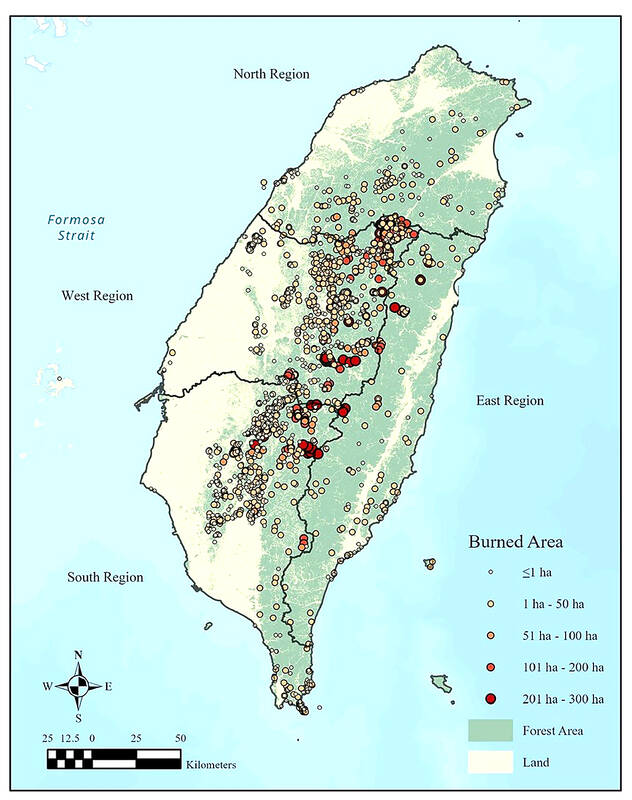Climate change has increased the risk of wildfires in Taiwan, especially in the dry season from November to April, a study published in the international journal Climatic Change found.
The study was jointly submitted by teams from National Chung Hsing University and Utah State University, and was published last month.
The peak season for wildfires has moved forward due to rain patterns and rising temperatures, the study said.

Photo courtesy of National Chung Hsing University
While Taiwan has rarely experienced large-scale wildfires due to its large number of evergreens and its high humidity, recent fires highlight the urgency for the country to adopt preventive strategies amid a changing climate, it said.
Using the Fire Weather Index and multiple climate model simulations, the study assessed and predicted weather patterns from 2021 to 2100, and found that the risk of severe wildfires in Taiwan would increase noticeably.
Northern and central Taiwan were deemed to be at greater risk of wildfires, the study found.
“Incorporating advanced climate projections into wildfire risk management will enable Taiwan to develop more effective strategies to mitigate the impact of forest fires,” said study coauthor Simon Wang (王世宇), a professor of climate dynamics at Utah State University’s College of Agriculture and Applied Sciences.
It is good that the Ministry of Agriculture is developing relevant assessment systems, he said.
He also urged the drafting of legislation to promote fire prevention education and other measures to slow the pace of climate change and reduce the threat to Taiwan’s overall safety and diverse ecosystem.
“Our findings reveal a future where wildfire risks are significantly heightened, demanding a re-evaluation of our fire management strategies,” said study coauthor, Liu Wan-yu (柳婉郁), a professor at National Chung Hsing University’s Department of Forestry.

An undersea cable to Penghu County has been severed, the Ministry of Digital Affairs said today, with a Chinese-funded ship suspected of being responsible. It comes just a month after a Chinese ship was suspected of severing an undersea cable north of Keelung Harbor. The National Communications and Cyber Security Center received a report at 3:03am today from Chunghwa Telecom that the No. 3 cable from Taiwan to Penghu was severed 14.7km off the coast of Tainan, the Ministry of Digital Affairs said. The Coast Guard Administration (CGA) upon receiving a report from Chunghwa Telecom began to monitor the Togolese-flagged Hong Tai (宏泰)

A cat named Mikan (蜜柑) has brought in revenue of more than NT$10 million (US$305,390) for the Kaohsiung MRT last year. Mikan, born on April 4, 2020, was a stray cat before being adopted by personnel of Kaohsiung MRT’s Ciaotou Sugar Refinery Station. Mikan was named after a Japanese term for mandarin orange due to his color and because he looks like an orange when curled up. He was named “station master” of Ciaotou Sugar Refinery Station in September 2020, and has since become famous. With Kaohsiung MRT’s branding, along with the release of a set of cultural and creative products, station master Mikan

RISING TOURISM: A survey showed that tourist visits increased by 35 percent last year, while newly created attractions contributed almost half of the growth Changhua County’s Lukang Old Street (鹿港老街) and its surrounding historical area clinched first place among Taiwan’s most successful tourist attractions last year, while no location in eastern Taiwan achieved a spot in the top 20 list, the Tourism Administration said. The listing was created by the Tourism Administration’s Forward-looking Tourism Policy Research office. Last year, the Lukang Old Street and its surrounding area had 17.3 million visitors, more than the 16 million visitors for the Wenhua Road Night Market (文化路夜市) in Chiayi City and 14.5 million visitors at Tainan’s Anping (安平) historical area, it said. The Taipei 101 skyscraper and its environs —

Taiwan on Friday said a New Zealand hamburger restaurant has apologized for a racist remark to a Taiwanese customer after reports that it had first apologized to China sparked outrage in Taiwan. An image posted on Threads by a Taiwanese who ate at Fergburger in Queenstown showed that their receipt dated Sunday last week included the words “Ching Chang,” a racial slur. The Chinese Consulate-General in Christchurch in a statement on Thursday said it had received and accepted an apology from the restaurant over the incident. The comment triggered an online furor among Taiwanese who saw it as an insult to the